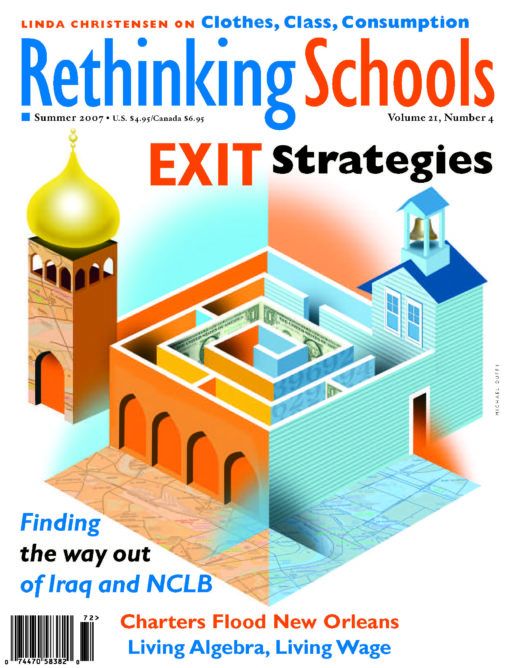Letters to the Editors 21.4
Illustrator: P.S. Mueller

Testing Isn’t Teaching
I found Lisa Gray-Garcia’s article, “Teaching Is Not Testing,” [Vol. 21, No. 2] to be fascinating and disturbing. How can we require exit exams for graduation without providing the proper resources or addressing the inequities that exist in our education system? This is a problem throughout the country.
Gray-Garcia did a fine job of shedding light on a dreadful situation in California while infusing some hope by discussing the collaboration between Youth Together, Justice Matters, and students who fought for multiple methods of assessment to supplement the exit exam.
I am often angered by the many examples of policies, such as No Child Left Behind, which are designed to benefit a few and keep the status quo. Yet this article does give me some hope. The families, students, and social reform groups had their voices heard. They may have lost the battle, but if the disenfranchised continue to come together and speak out against unequal education, then perhaps a much larger movement—one that encompasses many races, classes, and social groups—will force policy makers to make changes to a system that is intentionally broken, a system where only the privileged can succeed and the non-privileged remain where they are.
Our education system supports a class system that is becoming increasingly harmful to our nation. Yet hope lives in students, teachers, and educators throughout the nation. Let’s put it to use.
— Jay Nelson
Louisville, Ky.
Listen to Teachers
I wanted to say thank you for the brief coverage you gave our young organization in your recent issue [“Can NCLB Be Left Behind?” Vol. 21, No. 3]. I am, however, disappointed that you uncritically repeat National Education Association talking points without questioning their validity or value.
For example, you cite Joel Packer who argues, “The core of the NEA alternatives is to replace test and punishment with ways to make schools better, particularly focusing on professional development and stronger parent involvement.”
By this logic, teachers are to blame for “failing” schools. Otherwise, they wouldn’t need professional development.
We are eager to learn how the NEA will help schools by “increasing parent involvement.” Perhaps mandating a 30-hour workweek and then forcing parents to spend the extra time with their children?
Packer goes on to misrepresent the Educator Roundtable, writing: “But when they say repeal and don’t have any alternatives except state-level dialogues, that’s not useful in engaging Congress.”
For the record, our first alternative is state-level dialogues, as genuine education reform comes from asking teachers what their particular needs and concerns are.
Given the chance to control the direction of their schools, what would teachers ask for so that all students might develop to the best of their abilities? More or better tests? More or better professional development? More or better parental involvement? How about a curriculum that engages and excites?
We cannot answer these questions for teachers; they must answer for themselves. If Packer, the NEA, and corporate America understood this, we would be looking at a much different type of educational reform.
John Dewey believed in democracy because he believed in the capacities of ordinary individuals to run the institutions that shaped their lives. For the first time in the history of public education, we suggest listening to what our best teachers have to say about the conditions of their schools and then reforming education according to their diverse needs.
— Philip Kovacs
Chair, Educator Roundtable
Assistant Professor, Department of Education
University of Alabama in Huntsville
Oprah Fuels Crisis
The recent article “Elephants in the Room” [Gregory Michie, Vol. 21, No. 3] mentions an Oprah Winfrey show on the crises in education. I also watched that episode of Oprah’s show and even though she kept repeating, “You know I love teachers. Don’t you?” I wasn’t feeling the love.
I couldn’t help but feel slammed by the show. I felt like teachers were being blamed for all the problems that schools in crisis faced. Even her showcase of several specialty charter or private programs that were doing “good” things implied that public schools and public school teachers are the problem. Although the show called for funding of schools, it never addressed any of the other issues that cause schools to be in “crisis.”
— Lorraine Weyrauch
Beaverton, Ore.

